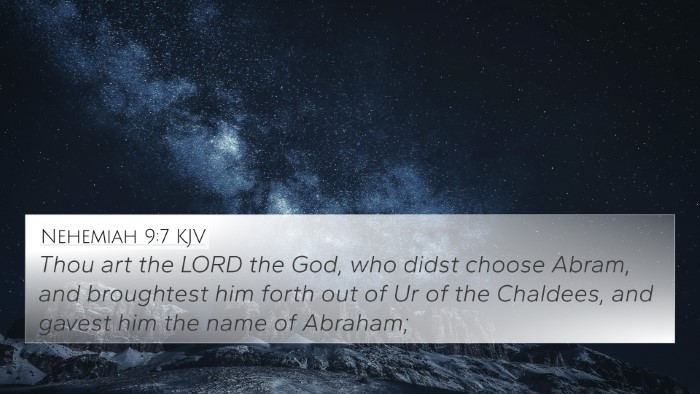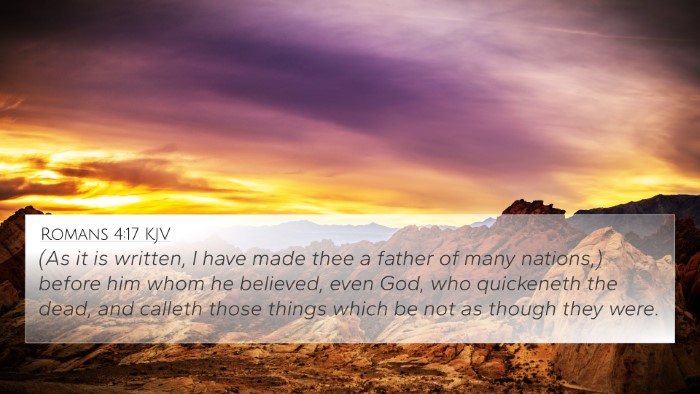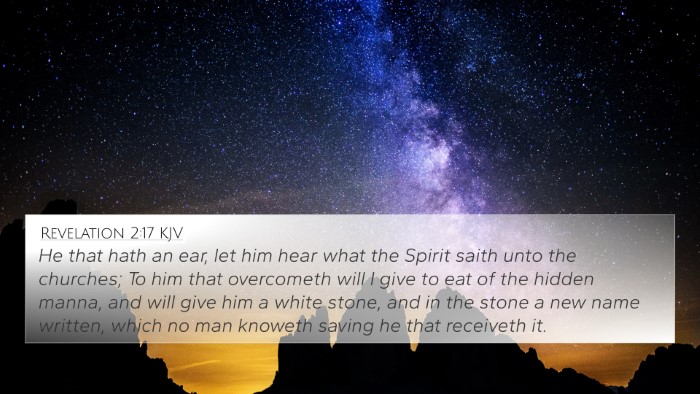Understanding Genesis 17:5
Genesis 17:5 states: "Neither shall thy name any more be called Abram, but thy name shall be Abraham; for a father of many nations have I made thee." This verse is a pivotal moment in the Abrahamic covenant, emphasizing the transformation of Abram to Abraham and the fulfillment of God's promise.
Meaning and Significance
This verse illustrates the following key points:
- Name Change: The renaming signifies a new identity and purpose. In biblical context, names often reflect character or destiny.
- Covenantal Relationship: God's declaration of Abraham as the "father of many nations" establishes a covenantal promise impacting future generations.
- Faith and Obedience: Abram's willingness to embrace this change demonstrates his faith and obedience to God's will.
Commentary Insights
Matthew Henry's Commentary
Matthew Henry emphasizes that the change from Abram to Abraham indicates a significant shift in Abram's life. Abraham becomes not just a patriarch but a figure of faith whose descendants would become numerous.
Albert Barnes' Commentary
Albert Barnes points out that the name "Abraham" meaning "father of a multitude" reflects the divine promise made by God. This highlights God's sovereignty and the assurance that Abraham's lineage would be blessed.
Adam Clarke's Commentary
Adam Clarke notes that the addition of "ham" to Abram's name introduces a sense of grandeur and significance. It serves as a prophetic declaration of the future that God has set forth for Abraham and his descendants.
Cross-References
This verse is closely related to several other biblical texts that enrich its understanding:
- Genesis 12:2-3: God promises to make Abram a great nation.
- Genesis 21:12: Isaac is named as the son through whom Abraham's blessings will come.
- Romans 4:17: Paul refers to Abraham as a father to many.
- Galatians 3:29: Believers in Christ are seen as Abraham's descendants.
- Hebrews 11:12: Abraham is noted for his faith despite old age.
- Isaiah 51:2: God encourages His people by recalling Abraham's example.
- James 2:23: Abraham is called the friend of God because of his faith.
Thematic Connections
The passage in Genesis 17:5 interlinks with broader biblical themes, such as:
- Faith and Covenant: Explores the nature of God's promises and human response.
- Identity in Christ: Reflecting on how the New Covenant transforms believers' identities.
- Promise and Fulfillment: A motif seen throughout the scriptures, illustrating the faithfulness of God across different dispensations.
Tools for Cross-Referencing
Using tools for biblical cross-referencing can enhance your study. Consider the following:
- Bible Concordance: Helps locate verses by keywords.
- Bible Cross-reference Guide: Offers connections between verses to deepen understanding.
- Comprehensive Bible Cross-reference Materials: Various publications provide extensive linkage between scriptures.
How to Use Bible Cross-References
To effectively utilize cross-references in your study:
- Read in Context: Always consider verses within their surrounding texts.
- Identify Themes: Look for recurring themes in different passages.
- Make Connections: Create notes on how different scriptures relate to the message of Genesis 17:5.
Conclusion
Genesis 17:5 is not just a declaration about Abraham's name; it encapsulates the promise of God to shape a nation through him. By exploring related scriptures and utilizing cross-referencing tools, one can gain a deeper understanding of both the immediate context and the broader narrative woven throughout the Bible.















